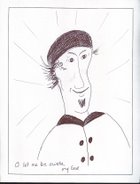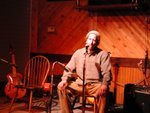A
new layer of pandemic precaution greets me inside the sliding doors
of the Fergus hospital.
I have come because my right hand is inflamed
with infection, leaving it hypersensitive from old,
caustic, masonry
burns compromised by cellular memories reacting to dust allergies
disturbed during our slow,
week by week move by car from our Elora
apartment to our Owen Sound flat, my hands compromised
by my initial
over-zealous application of disinfectant in both homes
have
left me now displaying the red, raw skin of my right hand to Health
Alliance nurses
probing my reasons for entering the hospital.
After
freshly sanitizing as per their instructions, they wince in empathy
as my stinging wounds
are offered to them; the lava-like reds of
flesh and dissolving skin-rock islands of molten mess
vouchsafe my
presence, but I also promise them that I have not traveled abroad or
knowingly embraced anyone recently returned from elsewhere;
I
admit my nose is runny but only when going out into the cold
as I
just did from my car to them and I have no fever, or dry cough,
what
I have are burning hands now yellow with pus from the workings
of a
previously applied off-the-shelf anti-bacterial cream responding too
slowly
to stop the catastrophic spread to every nerve in my body so
the guardian nurses
allow me down the hall to Emergency, adorned in
my new, accordion-fold mask,
which I wear like an entry prize.
I
expect to find the room full, but it’s almost empty, too many
patients
staying away from hospital hallways as vectors of death, but
I
know from the radio that emergency rooms are among the safest places
to be,
nonetheless, none of the usual suspects are here: no cuts,
bruises, breaks, gashes,
slashed bits or internal ruptures have come;
they must exist still in equal numbers,
since they’re always here,
but I take one of the many empty seats, as always by a window,
half
of all the
seats in the room taped-off as not-to-be-sat-in; a social distancing
measure
against happenstance and misadventure, while an older man,
stickered-defined as a Visitor,
gingerly pumps his own wrapped hand,
gazing out the window into internal, displacing realities.
I
am quickly registered and not long after taken by a nurse to inner
sanctums of triage care,
where I find myself once more trying to
articulate who I am from the self-isolated depths
of my own befuddled
solitude, until I am diagnosed, outfitted with a prescription and
sent on my way all the while aware that my last visit here was last
summer after
I found blood in my urine while returning home from
my
mother’s last cancer treatment in Barrie.
The
all-clears for both my mum and me were given separately last year,
but two and a half months ago, three weeks after her late-January
birthday,
her 88th, she died of a recurrence
that swept like a
crawl understood only afterwards as quick
back when Covid was still
no more than news of Canadians trapped on a cruise ship
just as the
World Health Organization was declaring a pandemic.
In
the aftermath of her death, international economies collapsed onto
essential workers
routinely under-valued though not in her eyes or
mine; events now flow in dazed weeks
while hopes for salvaging the
living Earth through humane intercessions keep
hoving into and out of
sight, nation after nation’s bipolar best and worst gathering
momentum
and she not here to cheer or decry any of it with me
in
the days before my first Mother’s Day without her.
I
leave the Fergus hospital distracted from the crawl of my
subcutaneous itch by
thoughts of mum gone, not there to phone while
the next patient registering is an older woman,
calling out questions
to her daughter as my sister once answered our mother,
knowing I will
never know their outcome.
Human
frailty shares itself: alienates complacency; existential kindness
is
offered and taken in glances, strangers greet in passing, often aware
that our common causes are now redefining the possible, to the point
that we can even imagine how the natural world might one day recover
from us.




No comments:
Post a Comment